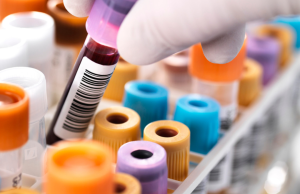 Dr Paul Huang
Dr Paul Huang
Institute of Cancer Research
Awarded: £74,227
Sarcoma UK are delighted to be partnering with LifeArc to fund this exciting research which hopes to improve outcomes for people with advanced soft tissue sarcoma.
The challenge
Sadly, people whose soft tissue sarcoma has spread to other parts of the body often have a poor prognosis. This is because the sarcoma is very challenging to treat at this stage, and so we are in desperate need of new treatments.
One possible treatment for soft tissue sarcoma is the targeted drug, pazopanib. It works by stopping cancer cells forming blood vessels they need to grow. People who take pazopanib see their cancer controlled for an average of three months, but unfortunately the drug is not currently approved for use on the NHS. This is because the response in patients varies greatly, and it’s not possible to identify at the start of treatment who is likely to respond best. This means pazopanib’s overall cost-effectiveness is not strong enough for it to be available on the NHS.
How will this project tackle this challenge?
Biomarker tests use a sample of tissue or blood from a patient, and looks for certain genes, proteins or other substances – a biomarker – that can provide information about cancer. Dr Paul Huang and Professor Robin Jones have developed one such biomarker test, known as KARSARC.
KARSARC works by measuring the levels of a panel of selected genes in a person’s tumour. It is thought to be the first biomarker test which can successfully identify who is most likely to respond to pazopanib long-term.
However, more evidence is needed before KARSARC can be used clinically, so in this project, Dr Huang and Professor Jones will work in collaboration with scientists at the MD Anderson Cancer Centre in the USA. They will test how effective KARSARC is in a clinical setting in the GENPAZ clinical trial, involving 145 patients with soft tissue sarcoma in the USA. The team will also establish if KARSARC can predict response to pazopanib for patients who have already had first- or second-line chemotherapy, to help more patients benefit from the test.
What this means for people affected by sarcoma
Being able to identify the patients most likely to benefit from pazopanib treatment could be hugely impactful. Not only could it ensure people receive treatment personalised to their needs, but it could also spare those for whom pazopanib is not effective from any side effects. The team hope that, if the test is effective clinically, it may provide enough evidence for the drug to be re-appraised by NICE, the body responsible for drug approval to the NHS.
‘The ability to identify patients with soft tissue sarcoma who will most likely benefit from pazopanib therapy using our biomarker test would aid clinical decision-making, increase the clinical and cost effectiveness of the drug, and improve patient outcomes,’ says Dr Huang.
Patients with soft tissue sarcoma whose cancer has spread have a very poor prognosis. Our biomarker test will be able give some of these patients more time before their cancer progresses, giving them extra precious time to spend with their loved ones. We hope that the results of this study demonstrate that, alongside our biomarker test, use of the drug pazopanib can be an effective and cost-efficient option for these patients on the NHS.
– Professor Robin Jones, co-investigator













